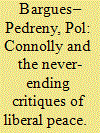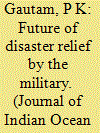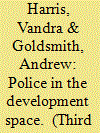| Srl | Item |
| 1 |
ID:
157532


|
|
|
|
|
| Summary/Abstract |
Over the last decade, a dominant critique of international interventions underlines the problem that interventionary strategies have denied the political, societal and cultural heterogeneity of conflict-affected societies, excluding the interests of the majority of their population. A deeper engagement with the everyday life of these societies is understood to expose the errors of international missions and animate an alternative way of thinking about peace: ‘hybrid peace’, which is formed contextually and from below. Engaging with William Connolly’s work on pluralism, this article clarifies the nature of this critique, which rests securely on the assumption that local alterity cannot be fully understood, respected or treated sensitively by international governance approaches. However, as much as this assumption enables the thinking of an emancipatory hybrid peace, it is in turn the source of its critique, as hybrid peace is also seen as reproducing binary schemas and thus considered incapable of caring for the societies intervened in. At the conclusion, the metaphor of vorarephilia—paraphilia where sexual arousal occurs in the idea of being eaten or eating another person—will be used to warn against the tragic direction that critiques seem to be travelling to: critical scholars would be increasingly tempted to welcome the inevitable failures of international interventions.
|
|
|
|
|
|
|
|
|
|
|
|
|
|
|
|
| 2 |
ID:
114908


|
|
|
| 3 |
ID:
123512


|
|
|
|
|
| Publication |
2012.
|
| Summary/Abstract |
International police now contribute the second largest proportion of personnel to peacekeeping missions after militaries. They are thus key contributors to post-conflict transitions in developing countries. In the past decade Australian police have played a major role in a range of international missions in the Asia-Pacific region, partially funded by Australia's international development budget. Increasingly the Australian Federal Police, as Australia's lead agency in this area, has explicitly adopted the development language of capacity building to describe a significant part of their role. This paper considers the contribution of Australian police to building or developing the capacity of new and/or re-formed police forces following conflict. It also examines the degree to which international police missions are able to contribute to broader development goals and achievements within these settings. In doing so, it engages with the question of 'outsiders' (non-development professionals) performing development work in the increasingly populated space of post-conflict recovery and reconstruction.
|
|
|
|
|
|
|
|
|
|
|
|
|
|
|
|
| 4 |
ID:
173122


|
|
|
|
|
| Summary/Abstract |
This article argues that military organizations display a more rigorous form of collective sensemaking than ordinary bureaucratic organizations. Military organizing is predicated on the rigorous modes of thinking and acting that follow from the particular military propensity to impose order on chaos. This trait is antithetical to modern notions of “the learning organization,” in which exploring variety and experimenting and testing out unproven methods are central. We identify two sets of structural conditions that constitute the sociocognitive landscape of military organizations and discuss how the military logic of action might be enacted in different sociocultural contexts. Our framework is brought to bear on recent research on international military missions, and in the concluding section, we summarize our arguments and discuss their wider implications in terms of trade-offs between adaptability and other capabilities in the design of military forces.
|
|
|
|
|
|
|
|
|
|
|
|
|
|
|
|